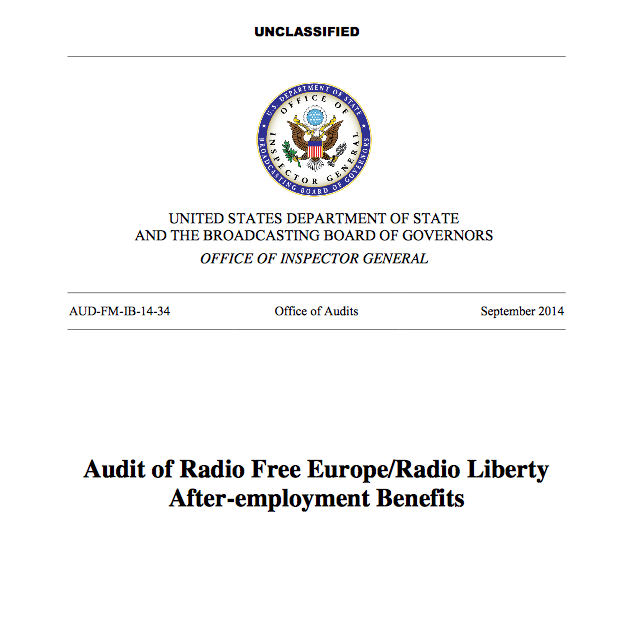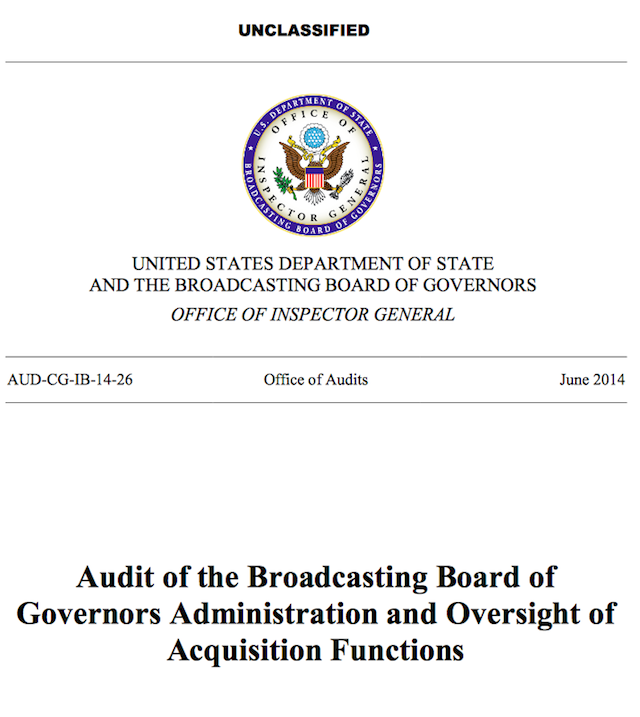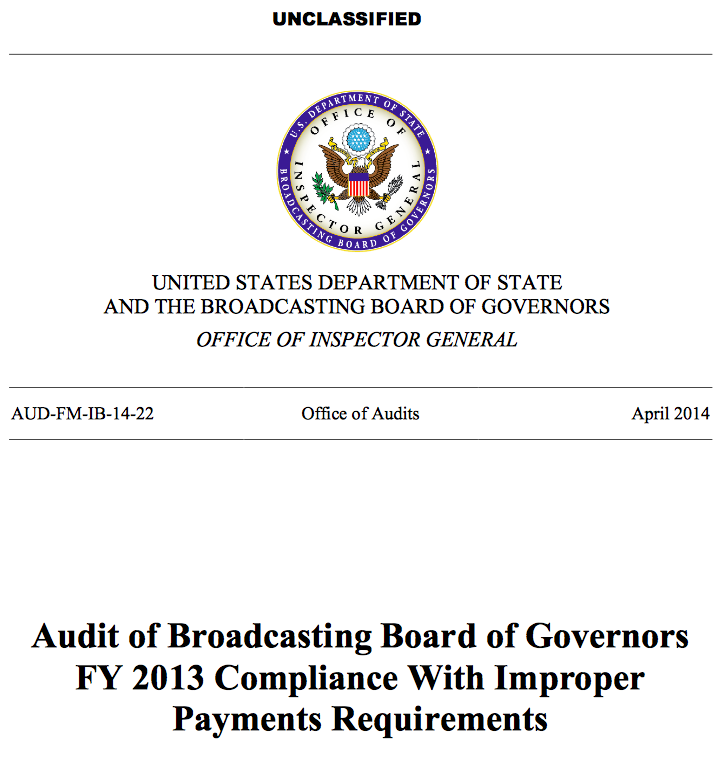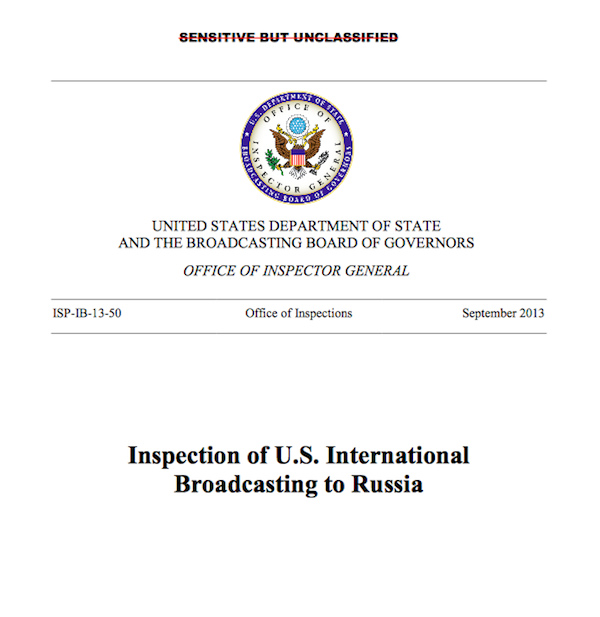BBG Watch Commentary
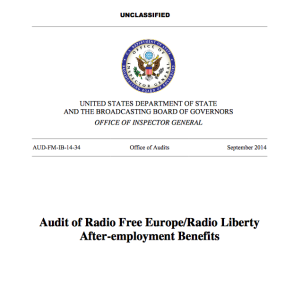 In yet another report detailing serious deficiencies and violations of federal regulations by the International Broadcasting Bureau (IBB) management within the Broadcasting Board of Governors (BBG) agency in charge of U.S. international media outreach, the Office of Inspector General (OIG) reported that Radio Free Europe / Radio Liberty (RFE/RL) had a potential unfunded liability of approximately $88 million, as of September 30, 2013, related to after-employment benefits. The OIG concluded, however, that RFE/RL post-employment plans were “allowable.” RFE/RL officials said that the unfunded liability was calculated by an actuary using the best information available at the time of calculation and based on reasonable assumptions.
In yet another report detailing serious deficiencies and violations of federal regulations by the International Broadcasting Bureau (IBB) management within the Broadcasting Board of Governors (BBG) agency in charge of U.S. international media outreach, the Office of Inspector General (OIG) reported that Radio Free Europe / Radio Liberty (RFE/RL) had a potential unfunded liability of approximately $88 million, as of September 30, 2013, related to after-employment benefits. The OIG concluded, however, that RFE/RL post-employment plans were “allowable.” RFE/RL officials said that the unfunded liability was calculated by an actuary using the best information available at the time of calculation and based on reasonable assumptions.
The OIG report blamed the BBG management team, which is located in the International Broadcasting Bureau, of having insufficient oversight of RFE/RL’s after-employment plans, but it also put the blame of the BBG Board. Many of the current BBG members and the BBG chairman, however, are relatively new and were not responsible for past deficiencies. The IBB also has a new management team since October 2013.
READ FULL OIG REPORT: Audit of Radio Free Europe/Radio Liberty After-employment Benefits, UNITED STATES DEPARTMENT OF STATE AND THE BROADCASTING BOARD OF GOVERNORS OFFICE OF INSPECTOR GENERAL, Office of Audits, September 2014
The report explains that the objective of the OIG audit was to determine to what extent costs related to RFE/RL’s after-employment benefits were allowable according to Federal grant regulations and the grant agreement. An external audit firm, Kearney & Company, P.C. (Kearney), acting on behalf of the Office of Inspector General, performed this audit from January to April 2014 in Washington, D.C.
The audit found that non-Federal RFE/RL did not violate any Federal grant regulations and its grant agreement with BBG. Previous OIG audits had found that the Federal BBG management within IBB and Voice of America (VOA) violated various Federal regulations in other areas, such as improper contract payments, “reportable violations of the Anti-Deficiency Act (ADA)” and exceeding its statutory authority to award personal services contracts (PSC). Ironically, a federal organization which failed to manage itself had a responsibility for monitoring the fiscal health of a generally well-managed non-federal entity. No recommendations were addressed to RFE/RL after the audit, but RFE/RL provided comments to the draft report.
The OIG reported that Kearney found that the RFE/RL severance plans for both U.S. and overseas employees were allowable. Although Kearney noted specific RFE/RL benefits that were more favorable than Federal equivalents, when aggregated as a total benefit package, Kearney concluded that the retirement benefits provided to RFE/RL’s U.S. employees were less favorable than the Federal benefits provided. Assuming that pensions and health benefits of the BBG’s Federal employees are also underfunded to the same or even larger degree, RFE/RL was costing U.S. taxpayers less money than the Federal part of the agency. But while Kearney concluded that the RFE/RL plans were in accordance with requirements, Kearney also found that RFE/RL had an unfunded liability of approximately $88 million, as of September 30, 2013, related to after-employment benefits.
According to the OIG report, BBG should have been monitoring long-term liabilities at RFE/RL and making appropriate recommendations or decisions on how they should be managed.
“BBG did not have sufficient oversight of RFE/RL’s after-employment plans. Specifically, BBG did not sufficiently monitor RFE/RL, adequately define roles and responsibilities related to grant oversight, and maintain adequate internal communications related to the grantee. Further, the format of financial reports required from RFE/RL did not include information on unfunded liabilities, and BBG had not performed benefit comparability studies in a complete or timely manner.
Because it was not effectively monitoring the financial condition of RFE/RL, BBG was not appropriately managing risks. The RFE/RL unfunded liability does not represent a legal liability to the Federal Government, and Federal Government officials have indicated that the Government will not provide additional funding to cover any shortfalls. However, the Federal Government may elect to provide additional funding to avoid the unfavorable outcome of discontinuing benefits,” the OIG report states.
Underfunding of retirement benefits is not uncommon and affects the Federal Government as well. For example, the OIG report notes that as of September 30, 2013, the Federal Government reported more than $3.4 billion in liabilities related to pension plans and $1.1 billion in liabilities related to post-retirement health plans.
“Kearney compared the benefits provided by RFE/RL to U.S. employees at retirement, as well as severance benefits, with benefits provided by the Federal Government and concluded that the benefits provided by RFE/RL, in the aggregate, did not exceed the benefits provided under Title 5 of the United States Code. Therefore, the after-employment benefits provided by RFE/RL to U.S. employees were allowable.” RFE/RL also employs many foreign nationals. The OIG report states that the after-employment benefits provided by RFE/RL to overseas employees or staff were also “allowable.”
RFE/RL and other non-Federal grantees reporting to the BBG are much better managed than IBB and VOA, where previous OIG audits found that improper contract payments and illegal hiring of contractors were common in the Federal part of the agency. Some of these problems at IBB and VOA still persist, while OIG gave Radio Free Asia (RFA), another independent, non-Federal grantee, a clean bill of health on contracts administration. The BBG’s non-Federal grantees function much more efficiently than the Federal part of the agency. The OIG report did not accuse RFE/RL officials of any violations of law or U.S. Federal regulations, as other OIG reports did in relation to fiscal administration at IBB and VOA.
Although Kearney found that the after-employment benefits provided by RFE/RL to its employees were allowable, two of RFE/RL’s after-employment benefits, the German defined benefits plan and the post-retirement health and life insurance plan for U.S. citizens and TCNs [Third Country Nationals], had unfunded liabilities of $88 million (approximately $87 million related to the post-retirement health and life insurance plan and $1 million related to the German pension plan) according to actuarial reports.
The potential unfunded liability of approximately $88 million does not appear to present an immediate emergency, according to RFE/RL officials whose management of the plans may in fact be in the best interest of the grantee organization.
RFE/RL officials indicated that the amount of the unfunded liability for the post-retirement health and life insurance plan may be misleading because of how the actuarial estimate is calculated. They pointed out that the unfunded liability was calculated by an actuary using the best information available at the time of calculation and based on reasonable assumptions. The liability can fluctuate widely over time depending on changing economic conditions and various assumptions. The estimated liability could be lessened if RFE/RL decreased the benefits provided to its employees.
Because of these variables, some RFE/RL officials said that they believed that the assets set aside for the benefits would be sufficient to provide the post-retirement benefits of current employees for an extended but not an indefinite period of time. Kearney found that RFE/RL had sufficient funding to continue the benefit plans for some years; however, there may not be enough funding to continue in perpetuity.
BBG Did Not Have Sufficient Oversight of RFE/RL
“Although Kearney considered RFE/RL’s after-employment benefits to be generally allowable according to Federal grant regulations and the grant agreements, Kearney identified several gaps in BBG’s controls over grantee oversight. Specifically, BBG did not sufficiently monitor RFE/RL. For example, employees who monitored the grantee were unfamiliar with the types of after-employment benefits offered by RFE/RL and did not review and approve contracts over a certain dollar amount. In addition, the grant files were incomplete. Kearney also found that BBG had not adequately defined roles and responsibilities for groups responsible for overseeing RFE/RL and that internal communications were not sufficient. Ensuring an appropriate internal control environment is ultimately the role of the Board of Governors. Further, BBG did not require that the financial reports from the grantee include details about unfunded liabilities. Lastly, BBG did not comply with the requirement to perform annual comparability studies for all types of benefits provided by RFE/RL,” the OIG report states.
Surprisingly, the OIG report does not specifically mention the International Broadcasting Bureau, which is directly responsible for monitoring the Grant Agreement with RFE/RL, but the OIG report does refer to the Office of the Chief Financial Officer (OCFO) as being “responsible for reviewing and approving financial plans and reviewing monthly reports of grant payments.”
At least before the management reforms announced by the BBG Board in October 2013, the CFO reported to the IBB director and deputy director. Former IBB director Richard Lobo had retired in November 2013. The renewed BBG Board under its new chairman Jeff Shell appointed a new three-person IBB management team while keeping longtime IBB deputy director Jeff Trimble who held previously high-level management positions at RFE/RL. Last week, the Board announced that it intends to hire respected journalist and media executive Andrew Lack, Chairman of the Bloomberg Media Group, as Chief Executive Officer of the BBG, but his appointment has not been yet finalized. He will inherit a federal agency with many management problems.
This is how IBB officials explained their failure to provide sufficient oversight.
“BBG attributed a number of these deficiencies to the lack of resources and employee turnover. According to BBG officials, BBG had experienced a high rate of turnover over the last few years, especially in the Office of the Chief Financial Officer (OCFO). The grant files should contain information sufficient to ensure that knowledge is shared among employees and that documentation is adequate for new employees to be able to perform sufficient oversight.
In FY 2014, BBG developed a Corrective Action Plan that outlined certain control improvements for grantee monitoring that would be implemented beginning in March 2014. BBG intended to review the financial statements more closely and to be more involved in the financial reporting of RFE/RL. As of May 2014, this plan had not been implemented by any office in BBG,” the OIG report states.
“The Grantee Handbook did not assign certain oversight responsibilities to specific offices within BBG. The Handbook states that OCFO was responsible for reviewing and approving financial plans and reviewing monthly reports of grant payments. However, many of the responsibilities for overseeing grantees were included in a general section labeled “BBG responsibilities.” No details were provided on which office within BBG was responsible for the grant agreement, the grant files, the tracking of payments, general monitoring, or periodic reviews.
Kearney found that OCFO had been unofficially performing some of the monitoring duties. However, the employee within OCFO who was monitoring RFE/RL had not been formally designated as a grants analyst, and his official duties did not include the requirement to oversee RFE/RL. The employee also had not been delegated authority to obtain information from RFE/RL and had to obtain the documents required to oversee the grantee from other parties within BBG. In addition, the employee said that he did not feel that he had the authority to go to RFE/RL to obtain additional information.
Further, the BBG Board of Governors was also involved in the grants monitoring process; for example, the Board reviewed and approved budgets and financial plans and worked with the grantees on various initiatives. However, the Handbook did not provide clear information on the differences between the roles of the Board and OCFO for fiduciary oversight. In addition, internal communication between the Board and OCFO was not always sufficient to ensure that the employee monitoring the grantee had sufficient information,” the OIG report states.
The report blames not only the IBB bureaucracy, but also the BBG Board.
“Without a clear policy establishing roles and responsibilities for grantee oversight and open lines of communication between various groups within BBG, BBG cannot effectively monitor its grantees. Because of the Board’s significant involvement in the oversight of the grantees, it has a responsibility to ensure that the roles and responsibilities are defined and internal communications are sufficient,” the OIG report states.
The lack of proper monitoring and oversight by the IBB bureaucracy and the BBG Board has created a potentially difficult situation for the U.S. Government and for RFE/RL employees.
“Although RFE/RL officials do not want to discontinue the benefits, RFE/RL officials stated that RFE/RL had no expectations that the Federal Government would provide additional resources to fund the liability in the future if the current plan assets were fully depleted,” the OIG report says.
The officials further stated that RFE/RL could abolish the plans or increase participants’ contributions to eliminate or decrease the amount of the liability related to the U.S. medical and life insurance plan. According to the officials, most (but not all) of the retirees would have other health care benefits that they could rely on instead, such as Medicare.
“Although there was no expectation on the part of RFE/RL management for the Federal Government to provide additional resources, if abolishing the post-retirement health and life insurance plans previously provided or significantly increasing retiree premiums were to become necessary, the effect could be that the Federal Government may elect to provide additional funding to avoid the unfavorable outcome of discontinuing these benefits. In addition, if RFE/RL had to cut benefits or could not offer benefits to new employees, employee morale for the remaining employees could be negatively impacted,” the OIG report states.
While OIG recommends greater BBG oversight over RFE/RL’s post-employment benefits, the BBG’s International Broadcasting Bureau has a poor record of managing itself. Other OIG audits found that IBB and Voice of America management have violated U.S. Federal regulations and wasted millions of dollars.
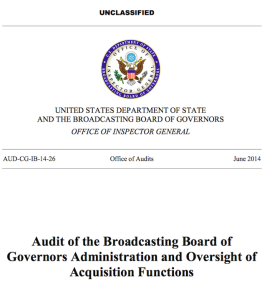 The Washington Times reported on Saturday, June 21, 2014:
The Washington Times reported on Saturday, June 21, 2014:
A new State Department Office of the Inspector General audit finds that the Broadcasting Board of Governors (BBG), the agency that oversees U.S. international broadcasting, has wasted almost $5 million in taxpayer dollars on questionable and unapproved purchases.
The State Department’s watchdog coined the BBGs mishap as a “systematic failure” of acquisitions.
Rep. Ed Royce (R-Calif.), Chairman of the House Foreign Affairs Committee said that the BBG’s “wasteful spending, non-competitive contracting practices, and violations of current law point to an organization without accountable leadership.”
In a statement released Saturday Mr. Royce said, “For the sake of our national security interests, it is critical that U.S. international broadcasting be effective; that is why we have to scrap this broken agency.”
READ MORE: ‘Scrap this broken agency’: Audit finds Broadcasting Board of Governors wasted $5M, Kellan Howell, The Washington Times, June 21, 2014.
Acquisitions and contracting at the federal part of the Broadcasting Board of Governors are done by the International Boadcasting Bureau, where the number of positions has grown by 37% in the last seven years while IBB executives proposed and carried out numerous cuts in news broadcadts and journalistic positions within the agency.
One of the offices that has grown substantially is the IBB Office of Contracts.
IBB executives are fighting to keep their jobs and oppose management reforms proposed unanimously by the House Foreign Affairs Committee in the bipartisan Royce – Engel bill, H.R. 4490, which was passed by the House of Representatives and is now awaiting further action in the Senate.
In June 2014, BBG Watch commented:
We feel sorry for new Broadcasting Board of Governors chairman Jeff Shell and all current BBG members. They have inherited a mess.
But they shouldn’t feel sorry for International Broadcasting Bureau and Voice of America executives, many of them still around in key positions, who have created this mess.
These officials should have been dismissed or reassigned to small, windowless offices in the basement of the Cohen building. The BBG Board could then tell Congress that at least all key IBB and VOA people responsible for this fiasco are no longer in charge and new managers are being appointed to deal with the problem.
As it is, there is a new three-person interim management team at IBB, but some key executives are still firmly in charge of various parts of the IBB bureaucracy where they had created these problems. There has been no management change at the Voice of America at all, and no accountability.
Not even a year after its last scandal, the U.S. Broadcasting Board of Governors is accused of wasting taxpayer money — again. The State Department and BBG’s Inspector General revealed mismanagement and abuse of power in a new audit, Reid Standish reported in Foreign Policy Blog in June 2014.
READ MORE: Waste and Abuse of Power at the Broadcasting Board of Governors, According to Audit, By Reid Standish, Foreign Policy Blog, June 17, 2014.
ALSO READ: Voice of America wasted estimated millions on improper contract payments, Radio Free Asia gets clean bill of health, BBG Watch, May 3, 2014.
ALSO READ: IBB – BBG Debacles – Legal by Jane Doe, BBG Watch, June 16, 2014.
